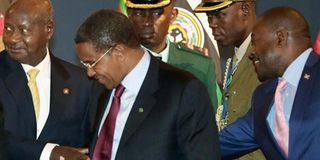US capital feels the pinch as African leaders visit

Uganda President Yoweri Museveni, Tanzania President Jakaya Kikwete and Burundi President Pierre Nkurunziza greet one another before a roundtable discussion with American and African business leaders at the US Chamber of Commerce on August 7, 2014 in Washington, DC. PHOTO | CHIP SOMODEVILLA
What you need to know:
- The Africans, who included the African Union chief, were attending a three-day, and a first, US-Africa Summit beginning Monday.
- Some roads were closed to the public, parking restricted, and transportation routes changed.
Residents and commuters in and to the US capital had a taste of what Africans go through whenever their Excellencies are conducting business in any town.
That’s because 50 African heads of state and governments, entourages in tow, were in Washington D.C. at President Barak Obama’s invitation.
Hence, some roads were closed to the public, parking restricted, and transportation routes changed.
The Africans, who included the African Union chief, were attending a three-day, and a first, US-Africa Summit beginning Monday. Such summit idea isn’t a product of Yankee know-how.
India, Japan and the European Union have convened them. China has perfected the art. Beginning 2000, China has had several. The payback tells the rest of the story.
At the venue the guest exchanged ideas with US officials, legislators, business executives, and donors. Presumably to maintain an aura of “equal partnership and mutual respect”, other than during photo-ops, President Obama met the Excellencies as a group. One-on-on encounters were out.
In the past such gatherings would be dominated by such issues as human rights — galore abuses in Africa — democracy, governance, and US aid.
This time the emphasis was on how the US and African governments can assist, by formulating policies, business people and entities on both sides make money on an “all-win” basis.
Two obvious observations: One, the idea of US aid as an instrument of development was on the back burner. Two, the China’s mantra on investment in Africa, “No questions asked,” was in vogue.
CHINA OVERTOOK US
That has done well for China. In 2009, China overtook the US as the largest trading partner with the African continent. As a second largest world economy, its share is $200 billion. The largest, world economy, the US, boasts of a paltry $85 billion.
In short, China is winning in what’s turning out to be another “scramble for Africa”, by peaceful means, of course. There’s a great deal to be had in the continent. It’s endowed with resources and elements that attract business people: growing economies, rising middle class and a large and young population.
In 2012, according to the International Monetary Funds, eight of the world’s 20 fastest growing economies were in sub-Sahara Africa. The average growth this year is forecast at 6.4 per cent and 5.8 next year.
Additionally, as US Secretary of State John Kerry noted, there are 700 people in Africa under the age of 30, “...a staggering youth bulge unknown at any time on the face of this planet.” With wise investments in health, education, food security, infrastructure, el al, that’s a phenomenal future market.
On departure, the Africans got promises of $17 billion in investments. It isn’t much for a continent’s estimated population of 1.111 billion last year, even considering the US supports other programs.
While the US has signalled being back in African business, what’s next. In a last month’s interview with The Economist, Obama said “the more the merrier” on foreign investments in Africa. But people should benefit and roads shouldn’t “just lead from mine, to the port, to Shanghai.”
He might as well have also said New York. Ultimately, though African leaders will have to make “more the merrier” for their people from the investment.




